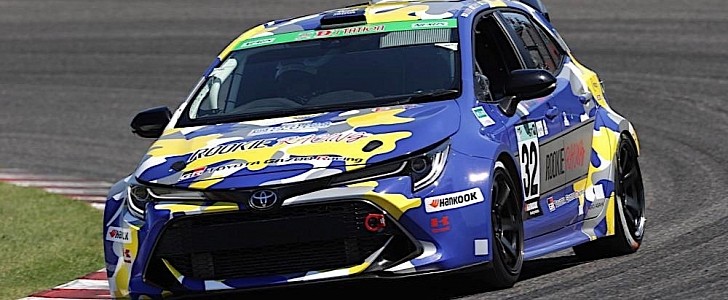Toyota was seen as a lone wolf in the auto industry, trying to push the hydrogen-fueled combustion engine into the mainstream. Now, the U.S. turbocharger giant BorgWarner and the Japanese piston ring specialist Riken are both developing technologies to burn zero-emission hydrogen in tomorrow’s engines.
Not everyone sees electric vehicles as a good option for the future of mobility. Some want to prolong the combustion engine’s life by making it burn clean fuels instead of dirty gasoline. Synthetic fuels and hydrogen are two popular options. However, the latter has not seen much adoption due to a lack of hydrogen-refueling infrastructure.
Until now, the engine juggernaut Cummins has advanced hydrogen combustion engine development for use in industrial and heavy-duty applications. Toyota is the only car maker demonstrating a hydrogen-fueled combustion vehicle for the consumer sector. But Toyota cannot move this industry by itself. Thankfully, a growing list of companies is warming to the idea.
According to Automotive News, BorgWarner is rolling out a full line of components for hydrogen engines, from injectors to rail systems and electronic control units. The Michigan company announced it won a contract to supply such parts to a European construction equipment manufacturer. On the other hand, Riken created a whole division dedicated to producing hydrogen engine components.
The auto industry spends billions of dollars to develop battery-electric vehicles and Li-ion batteries. Still, Toyota has been reluctant to jump on the BEV bandwagon. Instead, it has been a vocal advocate of hydrogen combustion. More producers started to consider the option for their vehicle engines. Among them are Daimler, MAN Truck and Bus, engine maker Cummins and powertrain specialist AVL.
Yamaha is also working on the development of hydrogen combustion engines. Earlier this year, the Japanese company demonstrated a 5.0-liter V-8 hydrogen engine based on the Toyota powertrain used in the Lexus RC F sport coupe. And it’s not just auto companies that try to push hydrogen engines. Rolls-Royce is teaming with easyJet to put hydrogen engines in planes.
Hydrogen combustion engines look promising, although they are nowhere near as efficient as hydrogen fuel cells, not to mention battery-electric vehicles. They can keep the existing supply chains in place and cause minimum disruptions to producers. On the other hand, burning hydrogen is still polluting even without carbon due to the NOx gases generated.
Until now, the engine juggernaut Cummins has advanced hydrogen combustion engine development for use in industrial and heavy-duty applications. Toyota is the only car maker demonstrating a hydrogen-fueled combustion vehicle for the consumer sector. But Toyota cannot move this industry by itself. Thankfully, a growing list of companies is warming to the idea.
According to Automotive News, BorgWarner is rolling out a full line of components for hydrogen engines, from injectors to rail systems and electronic control units. The Michigan company announced it won a contract to supply such parts to a European construction equipment manufacturer. On the other hand, Riken created a whole division dedicated to producing hydrogen engine components.
The auto industry spends billions of dollars to develop battery-electric vehicles and Li-ion batteries. Still, Toyota has been reluctant to jump on the BEV bandwagon. Instead, it has been a vocal advocate of hydrogen combustion. More producers started to consider the option for their vehicle engines. Among them are Daimler, MAN Truck and Bus, engine maker Cummins and powertrain specialist AVL.
Yamaha is also working on the development of hydrogen combustion engines. Earlier this year, the Japanese company demonstrated a 5.0-liter V-8 hydrogen engine based on the Toyota powertrain used in the Lexus RC F sport coupe. And it’s not just auto companies that try to push hydrogen engines. Rolls-Royce is teaming with easyJet to put hydrogen engines in planes.
Hydrogen combustion engines look promising, although they are nowhere near as efficient as hydrogen fuel cells, not to mention battery-electric vehicles. They can keep the existing supply chains in place and cause minimum disruptions to producers. On the other hand, burning hydrogen is still polluting even without carbon due to the NOx gases generated.






